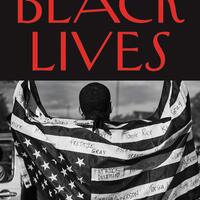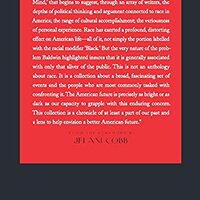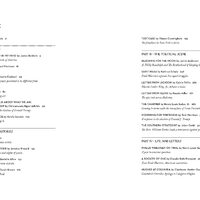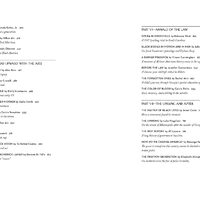The Matter of Black Lives: Writing from The New Yorker
Item
-
Title
-
The Matter of Black Lives: Writing from The New Yorker
-
This edition
-
"The Matter of Black Lives: Writing from The New Yorker." Ed. Jelani Cobb and David Remnick. New York: Ecco, 2021. 848 pp.
-
Table of contents
-
[Includes both black and white authors: the latter are marked with an asterisk]
● Jelani Cobb / Foreword (xi)
Part I: Reflections
● James Baldwin / Letter from a Region of My Mind (3)
● Toni Morrison / The Color Fetish (61)
● Malcolm Gladwell / Black Like Them (69)
● Jelani Cobb / Barack X (85)
● Chimamanda Ngozi Adichie / Now Is the Time to Talk about What We Are Actually Talking About (99)
● Kelefa Sanneh / The Color of Injustice (105)
Part II: Personal Histories
● Andrea Lee / Quilts (121)
● Jamaica Kincaid / Putting Myself Together (145)
● Danielle Allen / American Inferno (153)
● Sarah Broom / The Yellow House (179)
● Vinson Cunningham / Test Case (193)
Part III: The Political Scene
● Jervis Anderson / Reaching for the Moon (225)
● *Kathryn Schulz / Saint Pauli (247)
● *Calvin Trillin / Letter from Jackson (265)
● *Renata Adler / Letter from Selma (271)
● Henry Louis Gates, Jr. / The Charmer (289)
● Toni Morrison / Mourning for Whiteness (323)
● Jelani Cobb / The Southern Strategist (327)
Part IV: Life and Letters
● Henry Louis Gates, Jr. / Phillis Wheatley on Trial (349)
● *Claudia Roth Pierpont / A Society of One (363)
● Charlayne Hunter-Gault / Hughes at Columbia (385)
● Henry Louis Gates, Jr. / King of Cats (393)
● Hilton Als / Ghosts in the House (419)
● Alexis Okeowo / Secret Histories (447)
Part V: Onward and Upward with the Arts
● *Alex Ross / Voice of the Century (471)
● Stanley Crouch / The Colossus (481)
● *Emily Nussbaum / American Untouchable (499)
● Zadie Smith / Brother from Another Mother (507)
● *Calvin Tompkins / Radical Alienation (533)
● Hilton Als / The Shadow Act (557)
● Kelefa Sanneh / Gettin' Paid (581)
● Ta-Nehisi Coates / The Mask of Metal-Face Doom (599)
● Doreen St. Félix / The Autofictions of Kendrick Lamar (613)
Part VI: Annals of the Law
● *Rebecca West / Opera in Greenville (619)
● Edwidge Danticat / Black Bodies in Motion and in Pain (627)
● Vinson Cunningham / A Darker Presence (633)
● *Jennifer Gonnerman / Before the Law (647)
● *Rachel Aviv / The Forgotten Ones (667)
● *Calvin Trillin / The Color of Blood (693)
Part VII: The Uprising and After
● Jelani Cobb / The Matter of Black Lives (713)
● *Luke Mogelson / The Uprising (731)
● *Jill Lepore / The Riot Report (761)
● Keeanga-Yamahtta Taylor / How Do We Change America? (777)
● Elizabeth Alexander / The Trayvon Generation (793)
● Hilton Als / Homecoming (803)
Acknowledgments (821)
List of Contributors (823)
-
About the anthology
-
● Selections from "The New Yorker" from 1947 to the present, written by both black and white authors.
● Includes 46 items (including the preface), 13 by white writers and 33 by black writers.
-
Publisher's description
-
"A collection of The New Yorker‘s groundbreaking writing on race in America—including work by James Baldwin, Toni Morrison, Ta-Nehisi Coates, Hilton Als, Zadie Smith, and more—with a foreword by Jelani Cobb
"This anthology from the pages of the New Yorker provides a bold and complex portrait of Black life in America, told through stories of private triumphs and national tragedies, political vision and artistic inspiration. It reaches back across a century, with Rebecca West’s classic account of a 1947 lynching trial and James Baldwin’s “Letter from a Region in My Mind” (which later formed the basis of The Fire Next Time), and yet it also explores our current moment, from the classroom to the prison cell and the upheavals of what Jelani Cobb calls “the American Spring.” Bringing together reporting, profiles, memoir, and criticism from writers such as Chimamanda Ngozi Adichie, Elizabeth Alexander, Hilton Als, Vinson Cunningham, Henry Louis Gates, Jr., Malcolm Gladwell, Jamaica Kincaid, Kelefa Sanneh, Doreen St. Félix, and others, the collection offers startling insights about this country’s relationship with race. The Matter of Black Lives reveals the weight of a singular history, and challenges us to envision the future anew. "
-
Reviews and notices of anthology
-
● "Kirkus Reviews" 15 July 2021 (posted online 29 June 2021):
"Not all the writers in this New Yorker compilation are Black—e.g., Renata Adler, Calvin Trillin, Malcolm Gladwell [sic!]—but the most compelling of the pieces are drawn from lived experience. As Cobb writes, 'in its early decades, [the magazine] largely kept the subject of race at a distinct remove from its readers.' However, in 1962, as the civil rights movement grew in strength and intensity, the New Yorker published an essay that resounds throughout this book. Called 'Letter From a Region in My Mind,' James Baldwin’s piece angrily denounced a system in which 'the social treatment accorded even the most successful Negroes proved that one needed, in order to be free, something more than a bank account,' one in which Black people 'are taught really to despise themselves from the moment their eyes open on the world.' In the following essay, Toni Morrison recounts an attempt to write about race in such a way as 'to defang cheap racism, annihilate and discredit the routine, easy, available color fetish, which is reminiscent of slavery itself.' . . . An essential volume for readers interested in the Black past and present, as all readers should be."
-
Kirkus Reviews
-
● McCammon, Sarah. "Anthology 'The Matter of Black Lives' Reflects on America's Past to Guide Its Future." "All Things Considered." NPR. 15 Oct. 2021.
In this interview, Jelani Cobb, co-editor of the anthology, remarks that the editors began to think about the anthology in relation to Baldwin's 1962 essay "Letter from a Region of My Mind," which "The New Yorker" republished in the wake of the death of George Floyd and the protests it provoked: they started to conceptualize "a collection of work that in some ways could be thought of in dialogue with Baldwin across the years and across the decades."
Commenting on "The New Yorker"'s engagement with stories about black America, Cobb remarks: "The magazine was founded in 1925. You don't find much about race in the publication. You don't - certainly don't find very many writers of color or any writers of color in that early period writing about it. And then when African Americans do emerge, when they become part of The New Yorker's coverage, it's around jazz. It's through the lens of jazz criticism, sometimes profiles of jazz musicians. But Baldwin really kind of kicks open the doors into much broader coverage in 1962. And then, of course, the following year, Charlayne Hunter-Gault joined The New Yorker as the first Black staff writer."
-
NPR
-
● Tuttle, Kate. "'The Matter of Black Lives' Is a Conversation Continued." "Boston Globe" 30 Sept. 2021.
-
Item Number
-
A0547









